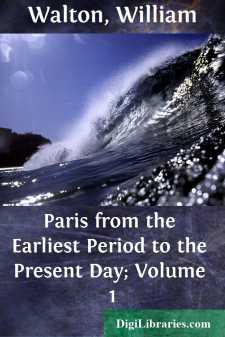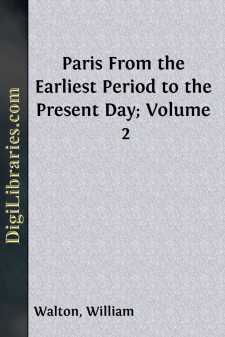Categories
- Antiques & Collectibles 13
- Architecture 36
- Art 48
- Bibles 22
- Biography & Autobiography 813
- Body, Mind & Spirit 142
- Business & Economics 28
- Children's Books 17
- Children's Fiction 14
- Computers 4
- Cooking 94
- Crafts & Hobbies 4
- Drama 346
- Education 46
- Family & Relationships 57
- Fiction 11829
- Games 19
- Gardening 17
- Health & Fitness 34
- History 1377
- House & Home 1
- Humor 147
- Juvenile Fiction 1873
- Juvenile Nonfiction 202
- Language Arts & Disciplines 88
- Law 16
- Literary Collections 686
- Literary Criticism 179
- Mathematics 13
- Medical 41
- Music 40
- Nature 179
- Non-Classifiable 1768
- Performing Arts 7
- Periodicals 1453
- Philosophy 64
- Photography 2
- Poetry 896
- Political Science 203
- Psychology 42
- Reference 154
- Religion 513
- Science 126
- Self-Help 84
- Social Science 81
- Sports & Recreation 34
- Study Aids 3
- Technology & Engineering 59
- Transportation 23
- Travel 463
- True Crime 29
Paris from the Earliest Period to the Present Day; Volume 1
by: William Walton
Description:
Excerpt
F the capital of the French nation, situated on the river Seine, were simply the most beautiful, the wittiest, wickedest, and most artistic of towns, if—as has been so often asserted (and not exclusively by the citizens thereof)—the most commonplace and the most brilliant of human manifestations alike take on new qualities, texture, and interest the moment they become Parisien, then, indeed, would this city be entitled to be considered only with that mild offence which is the proper intellectual attitude before all so-claimed earthly superlatives. But Paris is by no means to be so disposed of. The very peccability of her wit is demonstrated by the extravagant claims which it permits itself. No God-given institution proclaims itself as such,—at least, noisily. It is the shadings to this brilliant picture, the exceeding width and depth and blackness of the sun-spots on this luminary of civilization, which relieve us from any easy toleration and compel us to the liveliest attention. One of her many qualities is that of representing and, too often, of acting for the whole country,—indeed, la centralisation is one of the four great evils (the others being the abuse of alcool, la pornographic, and the stationary birth-rate) which are recognized by its own citizens as menacing the nation. So that, in a general way, for both good and bad, Paris reads France.
Well, the heights and depths which we are called upon to contemplate are not unendurable, but they are certainly in many respects unexcelled. "France," says one of her most eloquent and dignified historians, "has justly been termed the soldier of God;" "Other continents have monkeys," says a learned German philosopher; "Europe has the French." Any community or locality which offers, or is considered by intelligent observers to offer, such a range as this, is certainly worthy of high renown and deep research, and it is not too much to say that Paris justifies her fame. Within her walls the human mind has displayed its loftiest development, and the human passions their most insane excesses; her art and her literature have erected beacon-lights for all the ages to come, and have but too frequently fallen into the depths of more than swinish filth; her science of government has ranged from the Code Napoléon to the statutes of Belial himself; her civilization has attained an elegance of refinement unknown to the Greeks, and her cigars and lucifer-matches are a disgrace to Christendom!
Happily, as in several other human institutions, there is more of good than of bad. The so-called "seamy side" of cities is not like that of flour-bags,—equal in extent and importance to the fair outer surface that meets the eye. Much as has been published of the depravity of Paris, it is not that, but the splendid activity of her material and intellectual civilization, the serious confronting of the heavy problems of humanity, the intelligent accumulation of the treasures of the mind and the hand, legislation, literature, art, science, that impress the intelligent visitor. Moreover, it is the annals of unhappy nations only that are said to be interesting, and it is impossible that a quick human interest should not attach to the contemplation of this capital which has attacked so many problems, maintained so many struggles, and endured such crushing reverses. In the light of her most troubled history the import becomes clear of the galley on her shield, and her motto: "Floats, but sinks not." But few capitals have been more frequently, apparently, on the point of being submerged. Even as these lines are being written, it is agitated by the protracted and cumulating effects of a military and social agitation which, in the language of the President of the Cabinet of Ministers, "is deplorable, which paralyzes all commerce and creates a situation intolerable to all."
NDEED, it may be said that the present moment is the most critical, the most dramatic, in the long history of the city and the nation, and that an entirely new interest will henceforth attach itself to this crowned capital which sees herself in the inevitable future forever uncrowned. Never before has the pitiless march of events, the pitiless accumulation of irrefutable evidence, the testimony of so many observers, at home and abroad, so seemed to demonstrate that all the methods of government had been exhausted, and that the nation had attained her summit of power and was doomed to steady decline....



